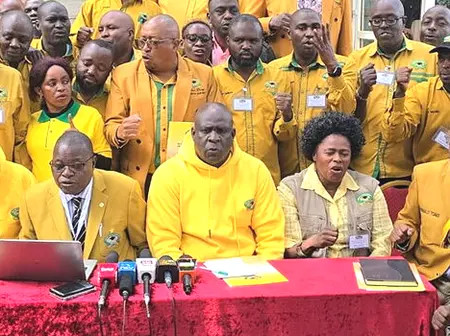The Kenya Junior School Teachers Association (KEJUSTA) has read a riot, issuing a strong and uncompromising warning to all aspirants eyeing positions in the Kenya Union of Post Primary Education Teachers (KUPPET) elections.
In an official statement released on Thursday, September 11, 2025, KEJUSTA declared that candidates who fail to openly support the full autonomy of Junior Secondary Schools (JSS) will not get their votes.
Signed by KEJUSTA chairperson James Evans Odhiambo, the statement underscored that the autonomy of JSS institutions is not optional but an urgent necessity that must be granted without delay.
“The autonomy of Junior Secondary Schools is not just an option — it is a necessity. It must be granted now,” read the statement.
KEJUSTA further stated that teachers will no longer be swayed by empty promises, vague manifestos, or political rhetoric. Instead, aspirants must prove their leadership through concrete action and unwavering support for JSS teachers’ welfare.
In the official communication, KEJUSTA outlined three core demands that every aspirant must embrace if they hope to secure the JSS teachers’ vote:
Advocating for full autonomy of Junior Secondary Schools – KEJUSTA insists JSS institutions should operate independently with clear funding structures, proper staffing, and representation.
Organizing and presenting JSS teachers’ demands to stakeholders – Aspirants must actively engage with education policymakers, including the Ministry of Education and the Teachers Service Commission (TSC), to ensure the concerns of JSS educators are heard.
Financing countywide press briefings – KEJUSTA wants aspirants to support nationwide efforts to amplify the voice of JSS teachers by financing public forums, press briefings, and campaigns.
The association concluded its statement with a clear message: “Our vote is our voice — and we will use it wisely.”
The demand for autonomy in Junior Secondary Schools has been simmering since the rollout of the Competency-Based Curriculum (CBC) that introduced JSS as a bridge between primary and secondary education.
With the numerous challenges facing JSS teachers, the time is ripe to use their numbers to advocate for their needs and made their voices count at the decision making table.
Some of the challenges they have put across for long are; unclear administrative structures, whereby many schools operate under primary heads despite having secondary-level learners, leading to conflicts in management.
Inadequate resources – they have cited insufficient teaching materials, poor infrastructure, and lack of proper laboratories.
Limited representation – JSS teachers argue that their voices are often overshadowed in education policy discussions dominated by primary and secondary school stakeholders.
Employment and staffing issues – Thousands of JSS teachers are still serving under internship terms with no permanent confirmation, sparking frustration and uncertainty.
KEJUSTA believes that granting autonomy will empower JSS schools to directly control their budgets, management, and curriculum delivery. This autonomy, according to Odhiambo, will not only uplift teachers but also ensure learners transitioning from Grade 6 to Grade 9 get quality education in well-structured environments.
With the KUPPET elections, scheduled for later this year, JSS teachers remain the highly contested group to tilt the victory for every aspirant salivating for top seats.
With thousands of JSS educators spread across all 47 counties, their voting bloc is seen as a game-changer. Aspirants who fail to secure JSS backing could face significant setbacks.

Leave a Reply